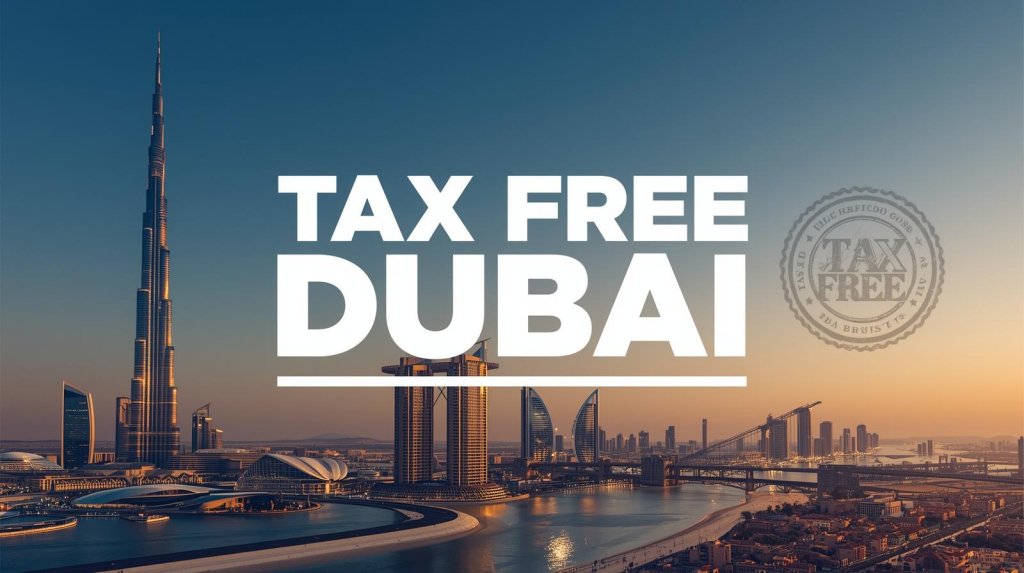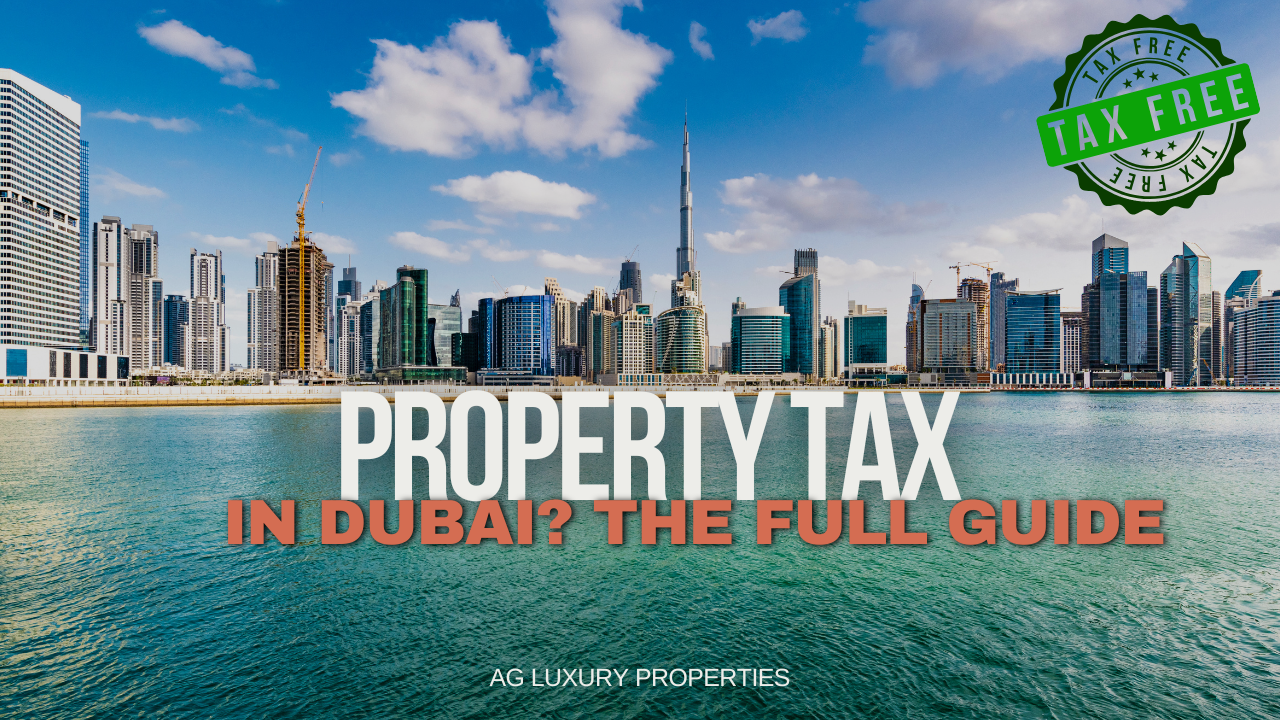Let’s get straight to the point: No, there is no annual property tax in Dubai.
This single fact is one of the biggest reasons the emirate attracts global investors. Dubai’s tax-free property ownership system helps people grow and preserve their wealth more efficiently than in most other cities.
For homeowners and investors, this means no recurring government tax each year. However, it’s still important to understand the initial costs when buying a property in Dubai. These one-time fees ensure your investment is legal and fully registered.
This 2025 guide will give you a clear picture of all the financial aspects of owning property in Dubai—from upfront costs to small ongoing expenses—so you can plan with confidence.
Dubai’s Annual Property Tax: The Short Answer

If you’re asking, “Is there an annual property tax in Dubai?” the answer is a firm no.
The Dubai government does not charge a yearly tax on freehold properties.
This gives Dubai a strong edge over major global markets like the UK, USA, or France, where property owners pay thousands every year in council or land taxes.
In Dubai, you can hold onto your property without worrying about a yearly deduction, which boosts long-term returns.
This rule applies equally to UAE nationals, expats, and foreign investors—making the market simple, fair, and transparent.
One-Time Costs When Buying Property in Dubai
Even though there’s no annual tax, you’ll face several one-time fees during the purchase process. These aren’t traditional taxes but necessary registration and administrative costs.
You should budget around 6% to 8% of the property’s price for these fees.
The largest of these is the Dubai Land Department (DLD) fee, also known as the property transfer fee, which is required for every transaction. Knowing these costs upfront will help you plan your total investment more accurately.
Typical One-Time Fees
| Cost Item | Description | Who Pays | Typical Cost |
|---|---|---|---|
| Dubai Land Department (DLD) Fee | Government charge to register the new owner’s name. | Buyer | 4% of property price |
| Agency Commission | Payment to your real estate agent. | Buyer | 2% of property price |
| Mortgage Registration Fee | Fee to register a home loan with DLD (if applicable). | Buyer | 0.25% of loan amount + AED 290 |
| NOC Fee | Developer confirmation that all dues are paid. | Seller (usually) | AED 500 – AED 5,000 |
| Trustee Fee | Payable when purchasing through DLD trustee offices. | Buyer/Seller | AED 2,000 – AED 10,000 |
💡 Tip: For cash buyers, the main costs are usually the 4% DLD fee and 2% agency fee, totalling about 6%.
Ongoing Costs (But Not Taxes)
While Dubai doesn’t charge any annual property tax, there are two regular expenses that every property owner should expect:
1. Service Charges
These are payments to the building management or owners’ association. They cover maintenance, security, cleaning, landscaping, and shared facilities like pools or gyms.
Service charges vary depending on the building and are calculated per square foot—usually AED 10 to AED 30 annually.
2. Utility Bills
Homeowners pay for electricity, water, and cooling (DEWA and district cooling providers such as Empower or Tabreed).
For apartments, expect monthly utility costs between AED 1,000 and AED 2,000, depending on size and usage.
These are not taxes, but essential running costs that maintain your property’s quality and value.
Rental Income Tax in Dubai
Another major advantage for investors: Dubai has no tax on rental income.
If you rent out your property, the income you earn is yours—no deductions by the government. You’ll only need to cover operating expenses like service charges, mortgage payments, or management fees.
With rental yields in Dubai often ranging from 5% to 8%, and no annual or rental income taxes, the net returns can be far higher than in other major markets.
Quick Cost Summary
| Expense Category | Initial Purchase Costs | Ongoing Annual Costs | Typical Range |
|---|---|---|---|
| DLD Fee | 4% of Property Value | N/A | Fixed by Government |
| Agency Commission | 2–5% | N/A | Negotiable |
| Mortgage Fees | 0.5–1% + admin | N/A | AED 5,000–20,000 |
| Legal/Admin Fees | AED 10,000–25,000 | N/A | Varies |
| Service Charges | Deposit at purchase | AED 10–30/sq ft yearly | Ongoing |
| Insurance | AED 1,000–10,000 | Annual Renewal | Based on coverage |
| Utilities Setup | AED 2,000–5,000 | Monthly bills | Varies |
👉 Buyers should budget roughly 7–12% above the purchase price to cover all fees and setup costs.
Why Dubai Stands Out
When compared with other countries, Dubai’s property ownership model remains one of the most cost-efficient worldwide.
With no annual property tax, no capital gains tax, and no rental income tax, it offers unmatched predictability and strong long-term value.
Conclusion: A Truly Tax-Free Advantage
To sum it up — there is no annual property tax in Dubai.
Buyers pay one-time government and agency fees at the time of purchase, but there’s no recurring yearly cost to keep your property.
This makes Dubai an ideal market for both investors and homeowners who value high returns and financial stability.
Ready to make the most of this opportunity?
Explore exclusive investment options in the best areas to invest in Dubai with AG Luxury Properties.
Our expert team will guide you through every step — ensuring a smooth, transparent, and rewarding investment experience.
FAQs
Q1: Do foreigners pay property tax in Dubai?
No. Dubai does not charge an annual property tax, regardless of nationality.
Q2: Are there hidden costs when buying property in Dubai?
Not really. Most fees are clearly defined — such as the 4% DLD fee and the agency commission. Additional costs may include DEWA deposits, bank fees, or moving-in charges.
Q3: Is the 4% DLD fee negotiable?
No, it’s a fixed government rate applied to every property transaction.
Q4: What’s the biggest financial benefit of buying in Dubai?
No annual tax and no rental income tax — meaning higher net returns for investors.
Q5: Who pays service charges after buying?
The new owner is responsible for service charges from the date of property transfer.

